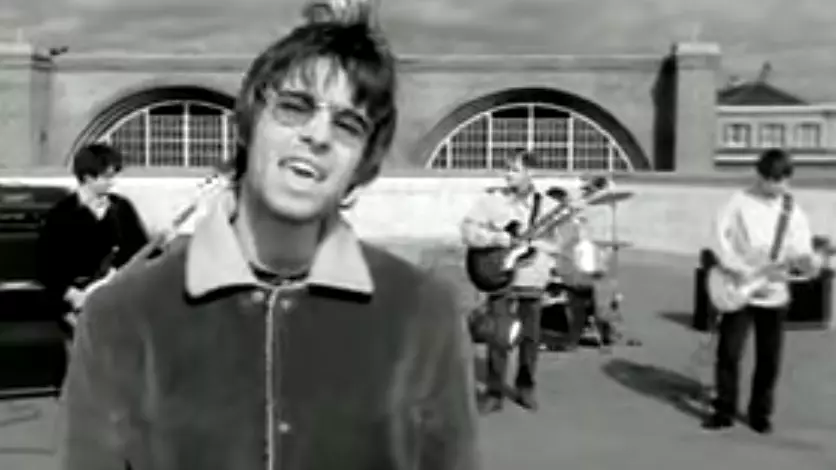
23 years ago today, Oasis burst onto the music scene with their debut single 'Supersonic'.
The band, signed to Creation Records by Alan McGee following an unscheduled performance at King Tut's Wah Wah Hut in Glasgow, consisted of Noel Gallagher, Liam Gallagher, Paul 'Bonehead' Arthurs, Paul 'Guigsy' McGuigan and Tony McCaroll, at the time.
Now, it'd be shocking to see more than two of these men in the same room, as Oasis has dwindled into the realms of distant memories for middle-aged men who wear parkas in summer.
Advert
Scotsman Alan McGee had travelled to King Tut's to watch his ex-girlfriend's band, but ended up enthralled by Oasis' four song set, particularly 'Bring It On Down'.
There and then, he signed them. Eventually, the band would have many troubles recording their debut album Definitely Maybe, redoing it until it was perfect. However, the first single, 'Supersonic', was done in one take in a studio in Liverpool on a night Noel Gallagher described as 'magical'.
Noel and Liam Gallagher talk about the brilliance of 'Supersonic'. Credit: Big Brother Records
Advert
The five Manc lads had originally intended to release 'Bring It On Down', but struggled to get it right. Therefore, out of frustration, Noel Gallagher left the room and decided to write a whole new song. He claims that it took him 'as long as it takes six people to eat a Chinese takeaway' to write it.
In terms of structure, it was a lot simpler, most noticeably with the drumming. The first line set the tone for the rest of the song: "I need to be myself/I can't be no one else," and was accompanied by a huge chorus and a riff that mimics George Harrion's in 'My Sweet Lord'.
In the video, Noel dons an offensive orange shirt while he plays lead guitar, Bonehead's haircut looks like it's from Sesame Street, Guigsy may as well not be there, and Tony McCaroll's constantly bouncing curly hair is an annoyance. But then there's Liam 'The Kid' at the front, looking cool as fuck in his shades and impeccable hair, telling everyone he knows a girl called Elsa who's into Alka-Seltzer.
The song would be a basis for what Oasis would achieve, not only in the next ten to 15 years, but also in the next three or four years.
Advert
Following 'Supersonic' was 'Shakermaker', a song showing off a 12 bar blues rhythm, and was a direct rip off of 'I'd Like to Teach the World to Sing (In Perfect Harmony)'. After that came 'Live Forever', the song that Noel says that 'changed everything'.
It became the signature song for Oasis during that period, really honing in on the fact that life was brilliant no matter what, which was what Oasis lived by.
The fourth and final single off Definitely Maybe was 'Cigarettes & Alcohol'. Yet again the melody was stolen from another track, with Noely G borrowing the riff from T-Rex's 'Get It On' and Humble Pie's cover of 'C'mon Everybody'.
The brothers talk about Definitely Maybe and Cigarettes & Alcohol in 1994. Credit: BBC/The O-zone
Advert
After the success of their first album, they followed it up with What's The Story, Morning Glory?. More familiar songs were on the album, such as 'Wonderwall', 'Don't Look Back in Anger', 'Roll With It', 'Champagne Supernova', 'She's Electric', 'Some Might Say' and 'Morning Glory'.
These songs, along with a plethora of B-sides from the two albums, such as 'Half The World Away', 'The Masterplan', 'Fade Away', a cover of 'I Am The Walrus', 'Whatever', 'Acquiesce', 'Round Are Way', a cover of 'Cum On Feel The Noize', would create a fan base that followed them up and down the country to shows at Maine Road, Earls Court and Knebworth.
In that short time the band believed what they did was unrepeatable given that now the music industry is dominated by downloads and online streaming. Back then, in the early 90s, it was the 'pre-digital era', where to be successful there had to be something about musicians. Something they stand for, enough to have a huge impact on culture and society.
Bands like Oasis and Blur did that, sparking the 'Battle of Britpop', whereby other bands like Pulp, The Verve, The Charlatans and Radiohead stood close by.
Featured Image Credit: Creation RecordsTopics: Oasis